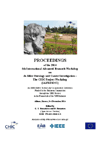 On November 3 - 4, 2014 the 6th International Advanced Research Workshop on In Silico Oncology and Cancer Investigation - The CHIC Project Workshop (IARWISOCI) was held in Athens, Greece. This IEEE-EMBS technically co-sponsored conference proved an excellent opportunity for contributing to the shaping and advancement of the emerging discipline of in silico oncology. The presented papers deal with the modelling of tumour dynamics and response to treatment from the biochemical to the macroscopic level and from basic science to clinics via information technology and legal and ethical considerations. They have been contributed by top researchers and international research groups active in the field. This year's workshop was dedicated to Aristotle and special focus was put on the collection, the processing, the exploitation and the legal and ethical aspects of the sine qua non multiscale clinical data which represent the Aristotelian observable reality. A one hour session of the workshop was even held on the very site of Aristotle's Peripatetic School.
On November 3 - 4, 2014 the 6th International Advanced Research Workshop on In Silico Oncology and Cancer Investigation - The CHIC Project Workshop (IARWISOCI) was held in Athens, Greece. This IEEE-EMBS technically co-sponsored conference proved an excellent opportunity for contributing to the shaping and advancement of the emerging discipline of in silico oncology. The presented papers deal with the modelling of tumour dynamics and response to treatment from the biochemical to the macroscopic level and from basic science to clinics via information technology and legal and ethical considerations. They have been contributed by top researchers and international research groups active in the field. This year's workshop was dedicated to Aristotle and special focus was put on the collection, the processing, the exploitation and the legal and ethical aspects of the sine qua non multiscale clinical data which represent the Aristotelian observable reality. A one hour session of the workshop was even held on the very site of Aristotle's Peripatetic School.
The workshop was funded by the European Commission through the transatlantic CHIC project (FP7 - Grant Agreement No 600841, http://chic-vph.eu) in the Framework of the Virtual Physiological Human (VPH) Initiative. The Proceedings will also appear in the IEEE Xplore Digital Library by the end of February 2015.
For further information, please visit:
http://6th-iarwisoci.iccs.ntua.gr
Download: Proceedings of the 6th International Advanced Research Workshop on In Silico Oncology and Cancer Investigation - The CHIC Project Workshop (IARWISOCI) (.pdf, 10.780 KB).
Download from eHealthNews.eu: Proceedings of the 6th International Advanced Research Workshop on In Silico Oncology and Cancer Investigation - The CHIC Project Workshop (IARWISOCI) (.pdf, 10.780 KB).